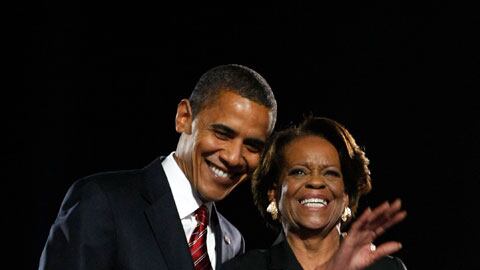
Marian Robinson, Michelle Obama’s 71-year-old mother, is moving to the White House to help make the transition smoother for her grandchildren, Malia and Sasha.
Her plan to accompany the Obamas represents a kind of on-the-ground cultural reality: Among African Americans and certain other ethnic groups, extended families are more common than among middle-class white families. My grandmother was certainly a constant presence when I was growing up—indeed, my parents bought my grandmother’s house and we all lived there together. Similarly, my great-aunts raised their families in a sequence of homes that were all more or less next door to one another; I used to think everyone in the neighborhood was a cousin of some sort. And having spent my life in academia, it’s interesting to note that at every school I’ve taught, at graduation there’s frequently a divergence over tickets: Black and Latino families tend toward an average of around ten tickets so as not to exclude extended family, while white families more commonly define themselves by the “all-American” stereotype of two parents plus two children.
African-American families like Michelle Obama’s have generally culturally attached to an “immediate” family that includes grandparents, aunts, uncles, and cousins to the third or fourth degree.
For all the kerfuffle about Robinson’s relocation, however, the Obamas will hardly be the first extended family moving to Washington—and even into the White House. But it hasn’t happened since Franklin Roosevelt, who brought his grandchildren with him. And so for more than half a century, we’ve been looking at life in the White House through the lens of a post-Depression, postwar model of nuclear family. It has been a model based on an expanding economy, growing suburbs, and the kind of geographic liberation cheap automobiles afforded. It was based on the GI Bill’s enabling young families to afford their own homes, thus leaving extended family and troublesome in-laws behind. Women could finally stop being Rosie the Riveter; men could stop living in Hooverville tents. There was, at long last, a chicken in every pot and a car in every garage.
At the same time, that particular reconfiguration of the smaller, mobilized family spreading out to enjoy boom times did not describe everyone in society. Single or poor working mothers, like Barack Obama’s, remained close to their extended families; indeed, that’s how he came to live with his grandparents for extended periods of time. Similarly, certain ethnic groups, including African-American families like Michelle Obama’s, have generally remained not just economically dependent but culturally attached to an “immediate” family that includes grandparents, aunts, uncles, and cousins to the third or fourth degree. It’s not surprising, therefore, to see that cultural legacy reflected in the Obamas’ domestic arrangements: There were cousins and uncles on the stage during Obama’s acceptance in Grant Park. There were sisters and in-laws all over the stage at the convention last August.
Marian Robinson is often described as the “linchpin” of the Obama family—and she’s largely responsible for the family’s ability to devote themselves to public service. She and her late husband never attended college but sent both of their children to Princeton. Only recently retired from her job as a secretary, she has been the one who kept the girls’ lives to a normal routine while their parents have been on the campaign trail—who got them to school, supervised homework, and put them to bed.
The timing seems right for an iconic American family that depends on a granny rather than a nanny. In the last few years of exhaustion and economic downturn, there has been a shift away from thinking that floors will mop themselves or that moms can really effortlessly whip up 30-minute gourmet meals after a long day at the office.
It is hard to be a parent. It is hard to earn a living in the modern workplace. It is very hard to do both, and it’s damn near impossible to do both without a whole lot of help from other people. The promise that fathers would be parenting partners and that women might “have it all” seems to have migrated away from questions of open doors and equal pay, and collapsed into the burdensome lie that any individual woman should be able to do “it” all by herself and all at the same time.
Thus we have the dizzying and hilarious spectacle of Sarah Palin trying to negotiate a spate of interviews in the kitchen, juggling questions about energy policy, double standards, and handmade potholders. What calculated imagery of tight-rope walking: There she was in a jeweled necklace and black Oscar de la Renta suit, stirring stew and serving hot dogs, expressing her intention to “call Hillary tomorrow” to express her gratitude for cracking that glass ceiling.
That image is why I resist thinking of Michelle Obama as “mom-ified,” as some have called her. She’s doing one thing at a time. She works, she shops, she mothers, but she remains sane. She relies on her mother, her brother, her co-workers, her friends to make things work. Her husband has done the same. Their dependence on a close network of others is a fact. As a result, their life seems balanced: They’re consistently calm and collected; neither makes work look irrelevant or parenting look like a dead end; and their children shine with that reflected intelligence and their own good manners.
As our culture becomes more varied and diasporic—and as our economy continues its awful downward spiral—I suspect we will engineer new or hybrid models of both work and family. Like the Obamas, we will learn how to depend on one another in cycles of sharing and independence, foregrounding certain talents at one point, and others at another. The role of primary breadwinner may go back and forth between partners over the course of a career. In a globalized world, the education of children can no longer be considered an entirely domestic affair, or derogated as lesser, or “merely” women’s work. And ultimately, the American workplace—as soon to be modeled by the incoming occupants of the White House—cannot, must not, remain so enduringly hostile to the needs of family life.
Patricia J. Williams has been published widely in the areas of race, gender, and law, and on other issues of legal theory and legal writing. Her books include The Alchemy of Race and Rights; The Rooster's Egg; and Seeing a ColorBlind Future: The Paradox of Race. She is a also a columnist for The Nation.






